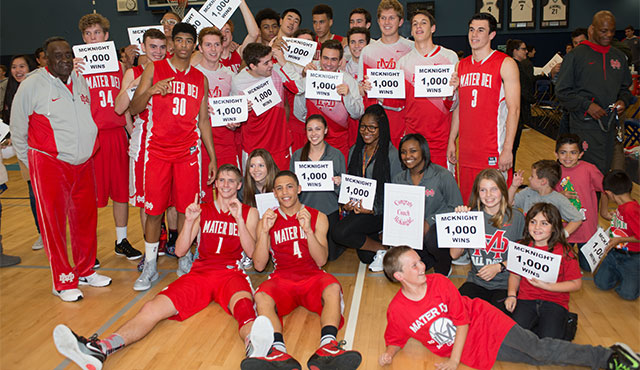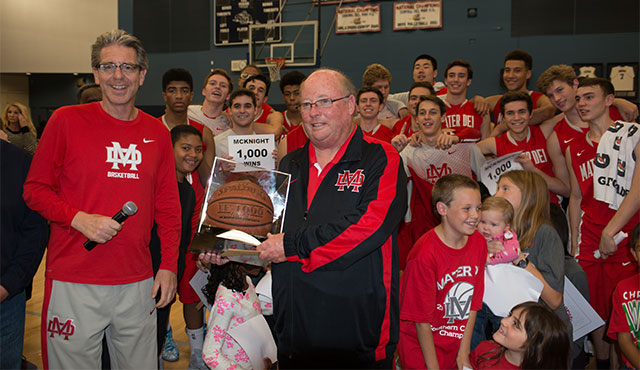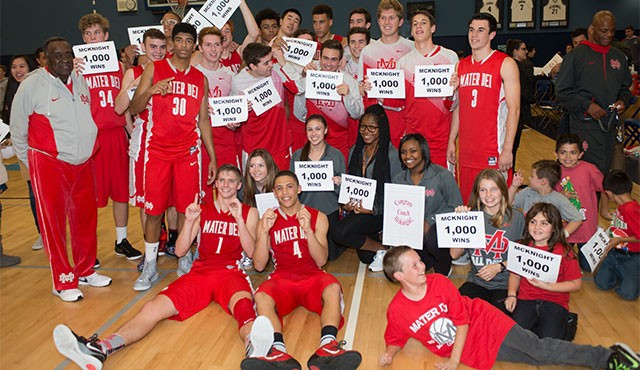The high school gym was packed for the annual Corona del Mar Beach Bash tournament, partly to see the home team do well, and partly to see if Gary McKnight, head coach of Mater Dei’s powerhouse boys’ basketball team, would produce his 1,000th victory.
If you were a stranger on the scene, you’d be forgiven if you didn’t recognize the unprepossessing, Hitchcockian figure sitting somewhat to the side of the bench of players and assistant coaches, all of whom seemed quite a bit more intense as the close, hard-fought game wore on. At first he didn’t dominate the huddle during timeouts, but just stood amid the bunch. Was he an alumnus who’d won a raffle ticket to sit with the team?
But if you kept an eye on him, you saw a different kind of intensity: a chess master studying the board, a bridge admiral assessing battle conditions as his junior officers handled the wheel.
Corona del Mar pulled ahead in the third quarter. By then, McKnight began taking over the timeouts, diagramming plays with a felt marker on a hand-held board. No shouting. No beet-faced exhortations. Mater Dei broke the game open in the fourth quarter. Final score: Mater Dei 67, Corona del Mar 44.
Festivities followed. In an interview miked so the crowd could hear, McKnight praised his players, his assistant coaches, his wife and family, the school’s athletic program. A crowd surrounded him, taking cell phone pictures. He was presented the game ball in a clear plastic case. A team photo followed, which included his nine-month old granddaughter Brooklyn. He was pleasant, low-key. He spoke with anyone who wanted to talk long after the crowd thinned out.
It isn’t just the 1,000 wins. It’s the 92-percent victory rate. It’s 31 league championships, 22 CIF Southern State Championships, and 11 CIF State Championships in 31 years, the length of McKnight’s tenure. The team began winning the moment he took over in 1983 and is currently ranked 12th in the nation.
How has McKnight done it?
“There are five basic elements in playing the game,” he says. “I’m pretty good at three of them. I’m good at reading players and situations before they develop. I have a sense what’s going on in front of me. The rest I leave to my other coaches. They know what I want. So do my players.”
“He could never get as far as he does without good players,” says Mater Dei’s athletic director, Phillip Bellomo. “But to stop at that would be unfair. He’s a master at putting in place what he needs. He knows what he doesn’t know and uses that to help himself. He relies on other people to do what they do best. But when the rubber meets the road, there’s no question who’s in charge.”
“It takes a village,” says assistant coach Jason Quinn, who’s worked in the program since 2001 (other coaches include son Clay McKnight, and Jerry DeBusk).
“We have administration support. Parents get involved. Each week one set of parents cooks dinner for the team. Seventy per cent of the student body plays sports. All the students have to do eighty hours of community work before they graduate. There’s a feeling of camaraderie and friendship at this school. And coach takes an interest in his players. He puts out a dish of candy on a locker room table. Any kid can come in and talk about what’s bothering him, whether it’s girlfriend trouble or acne trouble.
“We’ve beaten LeBron James, Carmelo Anthony and Kevin Durant when they were in high school. That shows you how hard the players work for coach.”
McKnight, 62, was born in Inglewood and moved to San Clemente during his schoolboy years.
“My father was a postman,” he says, sitting in a chair in his office, richly outfitted in Mater Dei memorabilia. “He told me, ‘Whatever you do in life, make sure it’s something you enjoy.’”
He paused to let the meaning sink in. He says he was once a hot-tempered, tough-talking coach. Now he’s patient, good-humored, even gracious in demeanor.
“Baseball was my life as a kid. I never played basketball. But I coached a youth program before I came here and liked it. You can’t play baseball when it rains.”
Asked what he looks for in a prospect, McKnight cites mental toughness as well as skill, and an ability to see the floor as opposed to playing with tunnel vision.
But young players mirror their coaches. A telling moment occurred after the Corona del Mar win. Taking congratulations, a flash of anger crossed his face as he said to no one in particular, “But I remember every one of my 85 losses.”
It was clear what he meant: Win or lose, fire in the belly never goes out.



